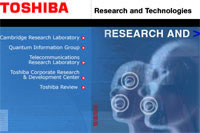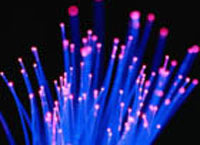 The clever-clogs at Toshiba Research Europe have announced that they have been successful in applying quantum cryptography to the transmission of video and voice over IP.
The clever-clogs at Toshiba Research Europe have announced that they have been successful in applying quantum cryptography to the transmission of video and voice over IP.
This means that it will be next to impossible for hackers to “tap” into voice and video files streamed over the net.
White coated boffins at Toshiba’s Cambridge UK labs demonstrated their Quantum Key Server system, which involves encoding bits of encryption data onto particles of light (photons).
This ultra secure technology looks set to revolutionise digital security by replacing the current distribution methods for keys, which are needed to decrypt secure messages.
 Toshiba’s quantum video link increases the security of communication systems by encrypting every single video frame with a unique digital key – so cracking one frame of a video would be useless unless all the other frames were cracked too.
Toshiba’s quantum video link increases the security of communication systems by encrypting every single video frame with a unique digital key – so cracking one frame of a video would be useless unless all the other frames were cracked too.
The secrecy of each of these keys is ensured by quantum cryptography, an ultra-secure key distribution method.
Dr Andrew Shields, head honcho of the Toshiba group developing the system, said, “Corporate networks are increasingly vulnerable to the theft of keys from the desktop, either by hacking, Trojans or fraudulent employees. The Toshiba Quantum Key Server mitigates this risk by allowing frequent key refresh.”
“The Toshiba Quantum Key Server can be used to enhance the security of not just video and speech, but also a wide range of other high bandwidth data communications, ranging from sensitive legal documents to medical and tax records.” he added.
Quantum cryptography also allows the key distribution link to be monitored for tapping and other skulduggery, and although we can’t pretend to understand half of what the good Doctor is on about, we liked this bit:
 “Imagine if you received a letter, you opened that letter and read it, there is no way of telling if someone has read that letter en route. When you encode the information on single particles, the letter self destructs whenever someone else reads it.”
“Imagine if you received a letter, you opened that letter and read it, there is no way of telling if someone has read that letter en route. When you encode the information on single particles, the letter self destructs whenever someone else reads it.”
“I sometimes say it is like the messages in Mission Impossible,” he added, “If anyone tries to read the messages, they self destruct.”
Toshiba has so far received “good feedback” from government and financial institutions shown the demonstrations, although commercial implementation looks to be some years away.